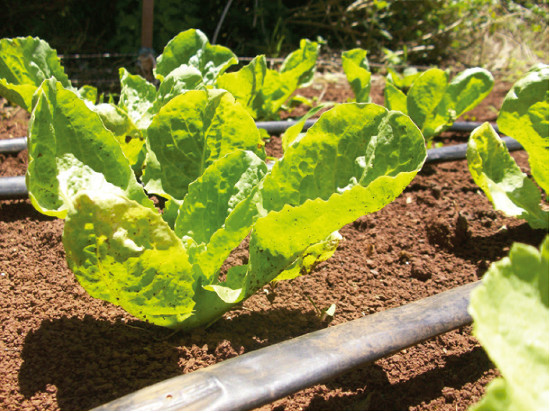Salicylic acid: effect on the physiological quality of <i>Cichorium endivia</i> L. seeds

Abstract
Salicylic acid (SA) is known to be involved in a series of physiological processes in the improvement of seed germination and vigor. The aim of this study was to evaluate the effect of SA concentrations on the physiological quality of escarole (Cichorium endivia L.) seeds, Escarola Lisa® cultivar. Escarole seeds were soaked for 24 h at concentrations 0, 0.05, 0.1, 0.15, and 0.2 mM of a similar to salicylic acid (Bion®) and afterwards submitted to germination and vigor tests (laboratory and greenhouse). The tested seed lots differed in their physiological quality. The use of salicylic acid does not present profits for the physiological quality of escarole seeds. However, it is suggested that new studies be carried out by testing this product under stress conditions or applied in stages after seed germination.Keywords
Germination, vigor, plant growth regulator, escarole.
References
- Brunes, A.P., L.W., Dias, I.D. Leitzke, A.S. Silva, and V.N. Soares, 2015. Tratamento de sementes de girassol com ácido salicílico. Encicl. Biosf. 11(21), 1847.
- Carvalho, P.R., N.B.M. Neto, and C.C. Custódio. 2007. Ácido salicílico em sementes de calêndula (Calendula officinalis L.) sob diferentes estresses. Rev. Bras. Sementes 29(1) 114-124. Doi: https://doi.org/10.1590/S0101-31222007000100016
- Costa, M.F., D.M. Moraes, and R.C.P. Moraes. 2000. Ácido salicílico: efeito na qualidade de sementes de soja. Rev. Bras. Sementes 22(1), 264-270. Doi: https://doi.org/10.17801/0101-3122/rbs.v22n1p264-270
- Cruz, C.D. 2013. Genes – a software package for analysis in experimental statistic and quantitative genetics. Acta Scient. Agron. 35(3), 271-276. Doi: https://doi.org/10.4025/actasciagron.v35i3.21251
- Guo, B., Y. Liang, and Y. Zhue. 2009. Does salicylic acid regulate antioxidant defense system, cell death, cadmium uptake and partitioning to acquire cadmium tolerance in rice? J. Plant Physiol. 166, 20-31. Doi: https://doi.org/10.1016/j.jplph.2008.01.002
- Kerbauy, G.B. 2008. Fisiologia vegetal. 2nd ed. Guanabara Koogan, Rio de Janeiro, Brazil.
- Klessig, D.F., C.A. Vlot, and D.A. Dempsey. 2009. Ácido salicílico, um hormônio multifacetado para combater a doença. Annu. Rev. Fitopatol. 47, 177-206.
- Maguire, J.D. 1962. Speed of germination aid in selection and evaluation for seedling emergence and vigor. Crop Sci. 2(1), 176-177. Doi: https://doi.org/10.2135/cropsci1962.0011183X000200020033x
- Pacheco, A.C., C.C. Custódio, N.B. Machado Neto, P.R Carvalho, D.N. Pereira, and J.G.E. Pacheco. 2007. Germinação de sementes de camomila (Chamomilla recutita (L.) Rauschert) e calêndula (Calendula officinalis L.) tratadas com ácido salicílico. Rev. Bras. Plantas Medicinais 9(1), 61-67.
- Pereira, M.F.S., S.B. Torres, P.C.F. Linhares, A.C.C. Paiva, A.E.S. Paz, and A.H Dantas. 2011. Qualidade fisiológica de sementes de coentro [Coriandrum sativum (L.)]. Rev. Bras. Plantas Medicinais 13, 518-522. Doi: https://doi.org/10.1590/S1516-05722011000500002
- Raskin, I. 1992. Role of salicylic acid in plants. Annu. Rev. Plant Physiol. Plant Mol. Biol. 43, 439-463. Doi: https://doi.org/10.1146/annurev.pp.43.060192.002255
- Shi, Q. and Z. Zhu. 2008. Efeitos do ácido salicílico exógeno sobre a toxicidade do manganês, elemento contens e sistema antioxidado no pepino. Environ. Exp. Bot. 63, 317-326. Doi: https://doi.org/10.1016/j.envexpbot.2007.11.003
- Silveira, M.A.M., D.M. Moraes, and N.F Lopes. 2000. Germinação e vigor de sementes de arroz (Oryza sativa L.) tratadas com ácido salicílico. Rev. Bras. Sementes 22(2), 145-52. Doi: https://doi.org/10.17801/0101-3122/rbs.v22n2p145-152
- Tavares, L.C., C.A. Cassyo, A.P. Brunes, S. Oliveira, and F.A. Villela, 2014. Treatment of rice seeds with salicylic acid: seed physiological quality and yield. J. Seed Sci. 36(3), 352-356. Doi: https://doi.org/10.1590/2317-1545v36n3636
Downloads
Download data is not yet available.
